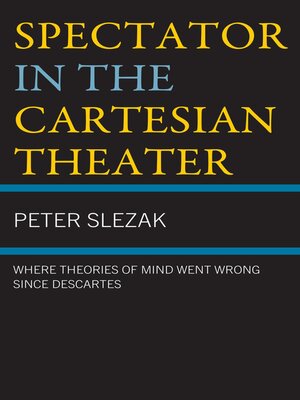Spectator in the Cartesian Theater
ebook ∣ Where Theories of Mind Went Wrong since Descartes
By Peter Slezak

Sign up to save your library
With an OverDrive account, you can save your favorite libraries for at-a-glance information about availability. Find out more about OverDrive accounts.
Find this title in Libby, the library reading app by OverDrive.



Search for a digital library with this title
Title found at these libraries:
| Library Name | Distance |
|---|---|
| Loading... |
The "Cartesian Theater" is Dennett's famous metaphor for the idea that a homunculus or "little man" watches the screen on which our thoughts appear. However, contrary to much academic teaching and scholarship, Spectator in the Cartesian Theater: Where Theories of Mind Went Wrong since Descartes shows that Descartes was not guilty of this fallacy for which he has been blamed. In his physiological writings neglected by philosophers, Descartes explained that the pseudo-explanation arises not from what is included in our theory of consciousness, but rather from what is missing. We fail to notice that the theory is incomplete because we are intuitively doing part of the explanatory work. That is, we are the spectators in the Cartesian Theater.
With detailed critiques, Peter Slezak shows that Searle's Chinese Room Argument, Kripke's theory of proper names, Davidson's semantics of natural language and Kosslyn's theory of visual imagery rely on what is intuitively meaningful to us rather than what follows from the theory. Slezak offers a novel solution to the elusive logic of the Cogito argument, showing it to be akin to the Liar Paradox. Since Descartes' perplexity is our own, this shows how the subjective certainty of consciousness and the mind-body problem can arise for a physical system. An intelligent computer would think that it isn't one.







